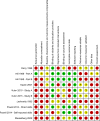Effects of School-Based Educational Interventions for Enhancing Adolescents Abilities in Critical Appraisal of Health Claims: A Systematic Review
- PMID: 27557129
- PMCID: PMC4996462
- DOI: 10.1371/journal.pone.0161485
Effects of School-Based Educational Interventions for Enhancing Adolescents Abilities in Critical Appraisal of Health Claims: A Systematic Review
Abstract
Background and objective: Adolescents are frequent media users who access health claims from various sources. The plethora of conflicting, pseudo-scientific, and often misleading health claims in popular media makes critical appraisal of health claims an essential ability. Schools play an important role in educating youth to critically appraise health claims. The objective of this systematic review was to evaluate the effects of school-based educational interventions for enhancing adolescents' abilities in critically appraising health claims.
Methods: We searched MEDLINE, Embase, PsycINFO, AMED, Cinahl, Teachers Reference Centre, LISTA, ERIC, Sociological Abstracts, Social Services Abstracts, The Cochrane Library, Science Citation Index Expanded, Social Sciences Citation Index, and sources of grey literature. Studies that evaluated school-based educational interventions to improve adolescents' critical appraisal ability for health claims through advancing the students' knowledge about science were included. Eligible study designs were randomised and non-randomised controlled trials, and interrupted time series. Two authors independently selected studies, extracted data, and assessed risk of bias in included studies. Due to heterogeneity in interventions and inadequate reporting of results, we performed a descriptive synthesis of studies. We used GRADE (Grading of Recommendations, Assessment, Development, and Evaluation) to assess the certainty of the evidence.
Results: Eight studies were included: two compared different teaching modalities, while the others compared educational interventions to instruction as usual. Studies mostly reported positive short-term effects on critical appraisal-related knowledge and skills in favour of the educational interventions. However, the certainty of the evidence for all comparisons and outcomes was very low.
Conclusion: Educational interventions in schools may have beneficial short-term effects on knowledge and skills relevant to the critical appraisal of health claims. The small number of studies, their heterogeneity, and the predominantly high risk of bias inhibit any firm conclusions about their effects. None of the studies evaluated any long-term effects of interventions. Future intervention studies should adhere to high methodological standards, target a wider variety of school-based settings, and include a process evaluation.
Systematic review registration: PROSPERO no. CRD42015017936.
Conflict of interest statement
The authors have declared that no competing interests exist.
Figures
References
-
- Rideout VJ, Foehr UG, Roberts DF. Generation M2: media in the lives of 8- to 18-year-olds. Menlo Park, California: Kaiser Family Foundation; 2010. Available: https://kaiserfamilyfoundation.files.wordpress.com/2013/04/8010.pdf. Accessed 31 May 2016.
-
- Skinner H, Biscope S, Poland B, Goldberg E. How adolescents use technology for health information: implications for health professionals from focus group studies. J Med Internet Res. 2003;5: e32 Available: http://www.jmir.org/2003/4/e32/. - PMC - PubMed
Publication types
MeSH terms
LinkOut - more resources
Full Text Sources
Other Literature Sources
Molecular Biology Databases



